Diplomatic Bluebook 2025
Opening Special Feature
Defending National Interests through Co-Creation with the World Cooperation with Global Partners
 Commemorative photo at the Japan-ASEAN (Association of Southeast Asian Nations) Summit (October 10, Vientiane, Laos; Photo: Official Website of the Prime Minister of Japan and His Cabinet)
Commemorative photo at the Japan-ASEAN (Association of Southeast Asian Nations) Summit (October 10, Vientiane, Laos; Photo: Official Website of the Prime Minister of Japan and His Cabinet) Prime Minister Ishiba speaking at the Japan-ASEAN Summit (October 10, Vientiane, Laos; Photo: Official Website of the Prime Minister of Japan and His Cabinet)
Prime Minister Ishiba speaking at the Japan-ASEAN Summit (October 10, Vientiane, Laos; Photo: Official Website of the Prime Minister of Japan and His Cabinet)Japan has worked to address the challenges and support the development of numerous developing countries over many years. Today, these countries have a major presence in the world as the “Global South” and are growing into key partners for shouldering the future of the international community. Looking ahead, it is essential for Japan to cooperate with global partners, including the developing and emerging countries that make up the “Global South,” in order to uphold the free and open international order based on the rule of law, tackle global challenges, protect Japan's own peace and security, and drive economic growth.
In 2024, as divisions and confrontations deepened in the international community over the situations in Ukraine and Gaza, and the security environment surrounding Japan became increasingly severe, Japan actively worked to collaborate not only with its ally and like-minded countries but also with the Global South to guide the international community toward reconciliation and cooperation.
As an example, the “officials in charge of cross-border economic affairs” have been designated at some diplomatic missions overseas to further support Japanese companies in their business expansion across borders, thereby contributing to the resolution of social issues in the Global South while also connecting that dynamism to Japan's economic growth.
In addition, Japan supported developing countries with the Co-creation for common agenda initiative(1) and Official Development Assistance (ODA) that mobilizes private-sector funds, which were newly set forth in the 2023 Development Cooperation Charter. Japan also actively promoted cooperation through Official Security Assistance (OSA), established in 2023 with the expectation of creating a desirable security environment for Japan by enhancing the security and deterrence capabilities of like-minded countries.
This feature introduces the 10th Pacific Islands Leaders Meeting (PALM10), the Tokyo International Conference on African Development (TICAD) Ministerial Meeting, and the Japan-CARICOM Ministerial-Level Conference, all of which were hosted by Japan in 2024 as part of its cooperation with global partners, particularly the Global South.
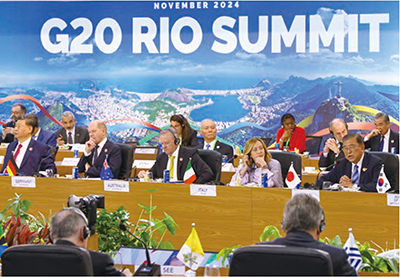 Prime Minister Ishiba speaking at the G20 Rio de Janeiro Summit (November 18, Rio de Janeiro, Brazil; Photo: Official Website of the Prime Minister of Japan and His Cabinet)
Prime Minister Ishiba speaking at the G20 Rio de Janeiro Summit (November 18, Rio de Janeiro, Brazil; Photo: Official Website of the Prime Minister of Japan and His Cabinet)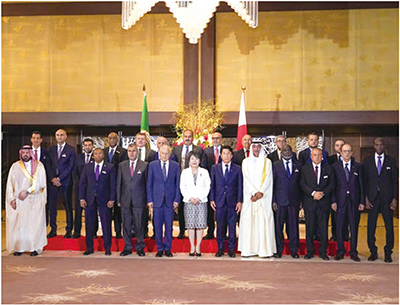 The 5th Japan-Arab Economic Forum Ministerial Conference (July 11, Iikura Guest House, Ministry of Foreign Affairs, Tokyo)
The 5th Japan-Arab Economic Forum Ministerial Conference (July 11, Iikura Guest House, Ministry of Foreign Affairs, Tokyo)- (1) Co-creation for common agenda initiative: A new initiative in which Japan proposes appealing cooperation menus that leverage Japan's strengths and combine ODA, Other Official Flows (OOF), and private sector funds in the areas that should be strategically addressed from a foreign policy perspective.
PALM10: The 10th Pacific Islands Leaders Meeting
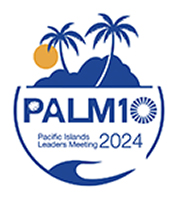
What is the Pacific Islands Leaders Meeting?
The Pacific Islands Leaders Meeting (PALM) is a summit held every three years since 1997 with the aim of facilitating candid discussions at the summit level on the various issues faced by Pacific Island countries and regions, contributing to regional stability and prosperity, and strengthening the partnership between Japan and the Pacific Islands countries region.
PALM10: Themes and Overview
●PALM10 was held in Tokyo from July 16 to 18. Under the co-chairmanship of Prime Minister Kishida and Prime Minister Mark Brown of the Cook Islands (Chair of the Pacific Islands Forum (PIF)), there was participation by leaders and others from 19 countries and regions, including Japan, 14 Pacific Island countries,(1) two French territories,(2) Australia, and New Zealand, as well as the PIF Secretary General.
●Discussions centered around the seven areas outlined in the PIF's “2050 Strategy”: (1) Political Leadership and Regionalism, (2) People-Centered Development, (3) Peace and Security, (4) Resources and Economic Development, (5) Climate Change and Disasters, (6) Ocean and Environment, and (7) Technology and Connectivity, as well as regional and international affairs.
 Commemorative photo of PALM10: Prime Minister Kishida and participants (July 18, Tokyo; Photo: Official Website of the Prime Minister of Japan and His Cabinet)
Commemorative photo of PALM10: Prime Minister Kishida and participants (July 18, Tokyo; Photo: Official Website of the Prime Minister of Japan and His Cabinet)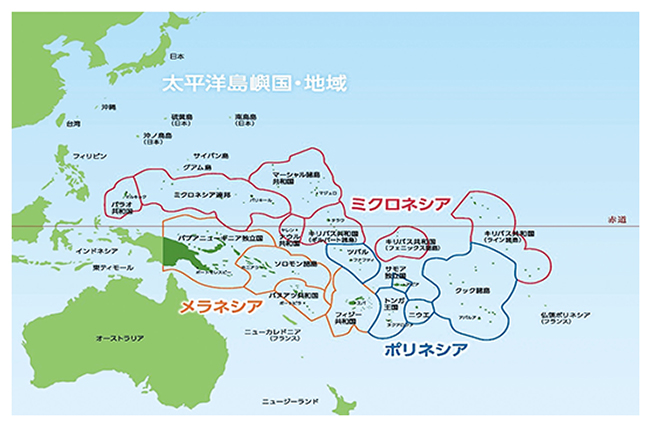
●Based on these discussions, Japan and the Pacific Island countries and regions reaffirmed their relationship to “stride forward together” toward the future while tackling common challenges, and adopted “The 10th Pacific Islands Leaders Meeting (PALM10) Japan – Pacific Islands Forum Leaders' Declaration” along with its annex titled “PALM10 Joint Action Plan.”
 Prime Minister Kishida at the opening session (July 18, Tokyo; Photo: Official Website of the Prime Minister of Japan and His Cabinet)
Prime Minister Kishida at the opening session (July 18, Tokyo; Photo: Official Website of the Prime Minister of Japan and His Cabinet)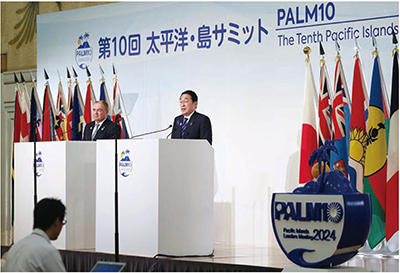 Prime Minister Kishida at the joint press conference (July 18, Tokyo; Photo: Official Website of the Prime Minister of Japan and His Cabinet)
Prime Minister Kishida at the joint press conference (July 18, Tokyo; Photo: Official Website of the Prime Minister of Japan and His Cabinet)Marking the milestone of the 10th summit, this occasion enabled Japan and the Pacific Island countries and regions to elevate their trust and cooperative relations to a new level in order to address contemporary challenges, and to present determination and a concrete path to “stride forward together” into the future.
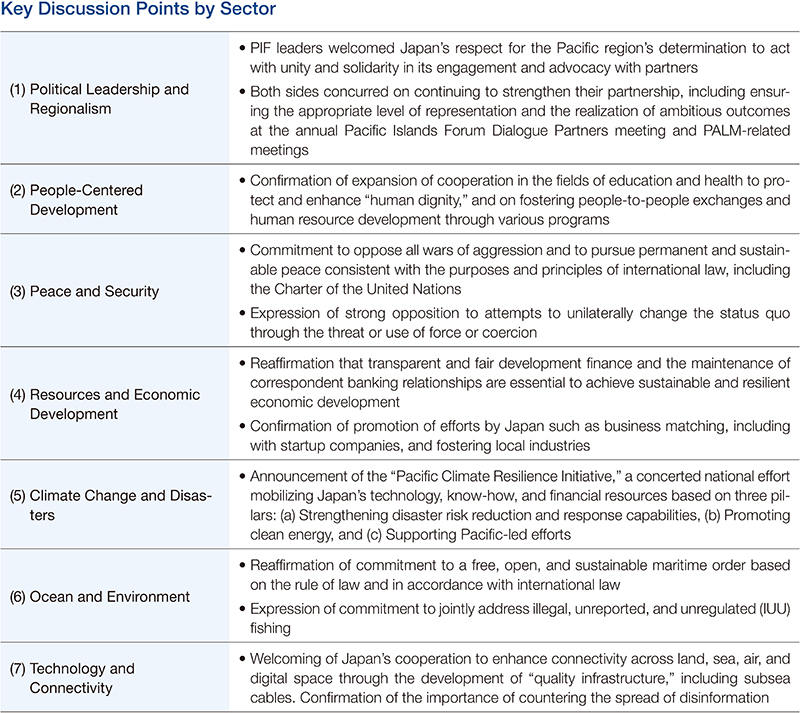
- (1) Cook Islands, Federated States of Micronesia, Fiji, Kiribati, Nauru, Niue, Palau, Papua New Guinea, Marshall Islands, Samoa, Solomon Islands, Tonga, Tuvalu, Vanuatu
- (2) French Polynesia, New Caledonia
Bilateral Meetings and Other Events with Pacific Island Countries and Regions
During PALM10, Prime Minister Kishida held 17 summit meetings and other meetings with leaders of Pacific Island countries and regions. In addition, prior to the summit, a welcome reception was held by Chief Cabinet Secretary HAYASHI Yoshimasa and his spouse on July 16, and a banquet was held by Prime Minister Kishida and his spouse on July 17. The banquet featured dishes prepared with ingredients from Ishikawa Prefecture to support reconstruction efforts of the areas affected by the earthquake in the Noto region, as well as a Japanese “summer festival” that embodied people-to-people exchanges. These events served as an opportunity to reaffirm the kizuna (bonds) between Japan and the Pacific Island countries and regions.
 Banquet hosted by Prime Minister Kishida and his spouse (July 17, State Guest House, Akasaka Palace, Tokyo; Photo: Official Website of the Prime Minister of Japan and His Cabinet)
Banquet hosted by Prime Minister Kishida and his spouse (July 17, State Guest House, Akasaka Palace, Tokyo; Photo: Official Website of the Prime Minister of Japan and His Cabinet)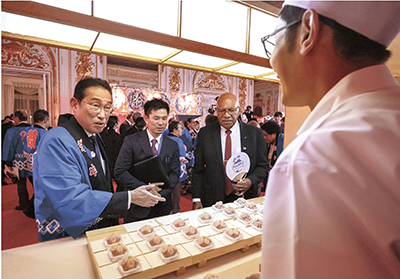 Prime Minister Kishida and Prime Minister Sitiveni Ligamamada Rabuka of Fiji visiting the stall of a Japanese confectioner from Ishikawa Prefecture at the “summer festival” (July 17, State Guest House, Akasaka Palace, Tokyo; Photo: Official Website of the Prime Minister of Japan and His Cabinet)
Prime Minister Kishida and Prime Minister Sitiveni Ligamamada Rabuka of Fiji visiting the stall of a Japanese confectioner from Ishikawa Prefecture at the “summer festival” (July 17, State Guest House, Akasaka Palace, Tokyo; Photo: Official Website of the Prime Minister of Japan and His Cabinet)